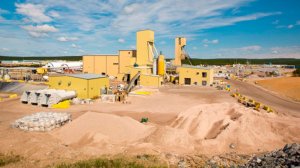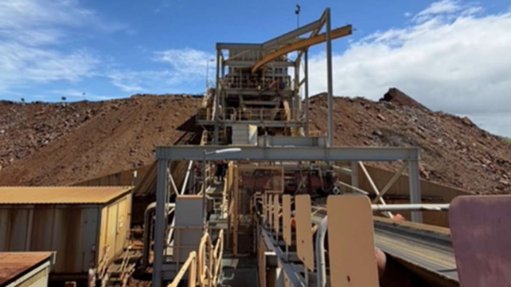Canada weighs export taxes on uranium, oil if Trump starts trade war
Canada is examining the use of export taxes on major commodities it exports to the US — including uranium, oil and potash — if incoming President Donald Trump carries out his threat to impose broad tariffs.
Export levies would be a last resort for Canada, according to officials familiar with the discussions inside Prime Minister Justin Trudeau’s government. Retaliatory tariffs against US-made goods, and export controls on certain Canadian products, would be more likely to come first, said the people.
But commodity export taxes — which would drive up costs for US consumers, farmers and businesses — are a real option if Trump decides to start a full-scale trade war, said the officials, speaking on condition they not be identified.
Trudeau’s government may also propose giving itself expanded powers over export controls as part of a scheduled update on the country’s fiscal and economic situation to be released on Monday, they said.
Canada is by far the largest external supplier of oil to the US; some refineries depend on buying cheaper Canadian heavy crude and have few alternatives to it. The US Midwest would be hit particularly hard by higher costs. Fuel makers in the region rely on Canada for almost half of the crude they turn into gasoline and diesel.
Canadian uranium is also the biggest foreign source of fuel for US nuclear power plants, and potash from the country’s western provinces is a huge source of fertilizer for American farms. Meanwhile, the US Department of Defense has been investing in Canadian projects to secure sources of cobalt and graphite and reduce reliance on Chinese supply chains.
For those reasons, some observers have said they expect Trump will exempt commodities from his threat to place 25% levies on goods from Mexico and Canada and focus instead on using tariffs against their manufacturing industries. In Canada’s case, that includes the auto manufacturing, aerospace and aluminium sectors, which are centred in Ontario and Quebec, where about 60% of Canadians live.
Trudeau’s government would have no choice but to respond if Trump simply exempted energy while hitting all other Canadian products, said the officials, adding that’s a scenario that could prompt the use of export taxes by Canada.
But for the prime minister, going down this path would cause serious political divisions within Canada. Oil, uranium and potash production are concentrated in the western provinces of Alberta and Saskatchewan. Those provinces are the strongest voter base for Conservative Leader Pierre Poilievre, and their provincial governments are staunch right-wing opponents of Trudeau.
“It’s a terrible idea,” Alberta Premier Danielle Smith said when asked about the possible use of export taxes.
“I don’t support tariffs on Canadian goods, and I don’t support tariffs on US goods because all it does is make life more expensive,” Smith said. “Instead, we’re taking a diplomatic approach and we’re meeting with our allies in the US.”
Saskatchewan Premier Scott Moe said export taxes “are the wrong approach and Saskatchewan will vehemently oppose the federal government imposing export taxes on our potash, uranium or oil.”
In an emailed statement via a spokesperson, Moe said Trudeau has not brought up export taxes during his phone calls with premiers, so “if they are under consideration, that would be a complete betrayal by the Trudeau government of the team approach they have been advocating and a complete betrayal of Canadians.”
HIGH-GRADE URANIUM
Although oil has received the most attention, uranium is also a critical source of imported energy for the US. Due to its civilian-military dual uses, the Canadian government can already apply export controls under existing authorities.
Canada supplies the US with about a quarter of its uranium needs for nuclear reactors, with the bulk of the material coming from ultra-high-grade mines in Saskatchewan. The world’s second-largest uranium producer, Cameco Corp., sells its uranium and fuel services directly to nuclear utilities predominantly in the Americas. US nuclear reactors rely heavily on uranium imports, as domestic production of the material is virtually non-existent.
Trudeau has publicly said Canada’s economy would be devastated if Trump followed through with 25% tariffs on everything the US imports from Canada. An export tax on commodities is a risky proposition for the Canadian economy, too — energy products alone make up about 30% of its exports to the US.
Steve Verheul, who was Canada’s chief trade negotiator during Trump’s first term and is now a private consultant, raised the prospect of export taxes as a tool Canada might need to use in a negotiation over tariffs.
Trump may decide to exempt oil, gas and food from his tariff plan, Verheul said at a Bank of Montreal event last week. Canadian officials are well aware of this, he said, and there is a discussion that it could “make sense for Canada to apply export taxes to those products in order to try to negotiate a broader exemption across all the sectors,” he said.
“I think this fight could escalate in certain ways if that kind of action is taken,” Verheul said.
Chrystia Freeland, Canada’s finance minister and deputy prime minister, has also suggested retaliation involving commodities. After a meeting with provincial premiers on Wednesday, she said some of them had proactively listed items — including critical minerals and metals — that could be part of a response.
Trudeau has experience battling Trump on tariffs during the renegotiation of the North American Free Trade Agreement in 2017 and 2018.
Trudeau’s primary goal is still to avoid a trade war with its No. 1 trading partner, and his government is planning major announcements on border security to show they are responsive to Trump’s goal of stemming the flow of migrants and fentanyl into the US. Canada is a much smaller source of both compared with Mexico, according to US government data.
Article Enquiry
Email Article
Save Article
Feedback
To advertise email advertising@creamermedia.co.za or click here
Announcements
What's On
Subscribe to improve your user experience...
Option 1 (equivalent of R125 a month):
Receive a weekly copy of Creamer Media's Engineering News & Mining Weekly magazine
(print copy for those in South Africa and e-magazine for those outside of South Africa)
Receive daily email newsletters
Access to full search results
Access archive of magazine back copies
Access to Projects in Progress
Access to ONE Research Report of your choice in PDF format
Option 2 (equivalent of R375 a month):
All benefits from Option 1
PLUS
Access to Creamer Media's Research Channel Africa for ALL Research Reports, in PDF format, on various industrial and mining sectors
including Electricity; Water; Energy Transition; Hydrogen; Roads, Rail and Ports; Coal; Gold; Platinum; Battery Metals; etc.
Already a subscriber?
Forgotten your password?
Receive weekly copy of Creamer Media's Engineering News & Mining Weekly magazine (print copy for those in South Africa and e-magazine for those outside of South Africa)
➕
Recieve daily email newsletters
➕
Access to full search results
➕
Access archive of magazine back copies
➕
Access to Projects in Progress
➕
Access to ONE Research Report of your choice in PDF format
RESEARCH CHANNEL AFRICA
R4500 (equivalent of R375 a month)
SUBSCRIBEAll benefits from Option 1
➕
Access to Creamer Media's Research Channel Africa for ALL Research Reports on various industrial and mining sectors, in PDF format, including on:
Electricity
➕
Water
➕
Energy Transition
➕
Hydrogen
➕
Roads, Rail and Ports
➕
Coal
➕
Gold
➕
Platinum
➕
Battery Metals
➕
etc.
Receive all benefits from Option 1 or Option 2 delivered to numerous people at your company
➕
Multiple User names and Passwords for simultaneous log-ins
➕
Intranet integration access to all in your organisation





















